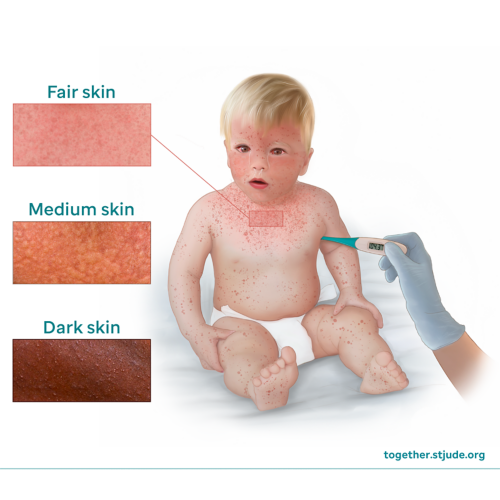Measles (also called rubeola) is an illness caused by a virus. It can spread quickly from person to person. Symptoms include high fever, cough, runny nose, and red skin rash.
Measles can be serious, especially for babies, young children, and people with weak immune systems. Having a weak immune system makes it hard to fight off infections and increases the risk of complications.
Children with measles can develop potentially life-threatening problems such as pneumonia and brain swelling. In the United States, about 1 out of 5 unvaccinated people who get measles need hospital care. This risk is higher in young children.
Measles vaccination works very well to prevent the illness. Talk to your health care provider about the MMR vaccine. People with weak immune systems cannot get the MMR vaccine because it contains live virus.
Signs and symptoms of measles include:
- Fever
- Cough
- Runny nose
- Red, watery eyes (conjunctivitis)
- Tiny white spots inside the mouth (Koplik spots)
- Rash
How measles symptoms start
- It takes about 7–14 days for symptoms to appear after a person is exposed to measles.
- Fever is usually the first symptom. Fever may reach 104°F (40°C) or higher.
- A skin rash develops 3–5 days after symptoms start. This is usually about 14 days after being exposed to the virus.
- The measles rash begins at the hairline, moves to the face and upper neck, and then moves down the rest of the body. It usually lasts 5–6 days.
Your health care provider will do a physical exam and ask about symptoms and possible exposure to the virus. Measles is diagnosed through tests of blood or urine or a sample from a nose or throat swab.
Measles is caused by a virus, and there is no specific treatment for the infection. Most people recover in 10–14 days.
To help manage symptoms of measles:
- Drink plenty of fluids.
- Rest.
- Treat symptoms using over-the-counter medicines as recommended by your health care provider.
Watch for worsening of symptoms or health problems such as ear infections and diarrhea. Monitor for emergency warning signs such as dehydration, seizures, decrease in level of consciousness, or breathing problems. Seek medical care if symptoms get worse or do not improve.
The MMR vaccine works very well to prevent measles. It protects against 3 illnesses: measles, mumps, and rubella.
Children usually get 2 doses of MMR vaccine given as a shot:
- Babies usually get the first MMR dose after their first birthday.
- Children get another dose between 4–6 years of age.
Your child’s MMR vaccine schedule may be different if you live in a country other than the United States or travel internationally.
Some people may get an MMRV vaccine which protects against measles, mumps, rubella, and varicella (chickenpox).
MMR vaccine in children with weak immune systems
The MMR vaccine contains live strains of measles, mumps, and rubella. The strains in the vaccine are weaker than the actual virus. They are harmless to people with normal immune systems. But children with weak immune systems cannot get the MMR vaccine because it contains live virus.
Talk to your care team about getting the MMR shot for family caregivers and siblings. When all other family members are vaccinated, it helps provide a circle of protection around the patient.
If you have questions about measles or the MMR vaccine, please talk to your care team.
Measles spreads through the air by small droplets that contain the virus. It passes easily from person to person. A person with measles can spread the virus from 4 days before the rash appears until 4 days after it appears.
If you or your child has been near someone with measles, then you have been exposed to the virus.
The measles vaccines work very well to protect against measles. People who have had measles before are usually protected against future infection. But among those who lack immunity, up to 9 in 10 people who are exposed to measles will become infected. This is how measles outbreaks occur.
What to do if you are exposed to measles
People who have been vaccinated against measles or who have had measles before have a low risk of getting sick.
If a person is not vaccinated, getting the MMR vaccine within 72 hours of exposure to the virus might prevent the disease. If you or your child has been exposed to measles or has symptoms, call before going to your clinic or hospital to avoid exposing others to the virus. This helps protect others, especially those who may not be vaccinated or are at high risk.
If you have not been vaccinated or if you are not sure if you have immunity, talk to your health care provider about getting the MMR vaccine.
Questions to ask your care team
Find more information on measles and measles vaccination




